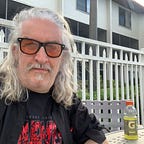Spotlight series #55: Carrie Olivia Adams
Curated by Canadian writer, editor and publisher rob mclennan, the “spotlight” series appears the first Monday of every month.
STATEMENT
Even before our current pandemic lives, I was an interrogator of loneliness. The power and beauty of being alone. The terror and anxiety of one’s chattering mind on its own. Maybe it’s because I was an only child. Though I think even if I had been one of a dozen, I likely would have still felt singular, an outsider, an observer. Isolation takes many forms.
My poems are often research-based — whether that’s dismantling a found text or more scholarly investigation, following my curiosities down various rabbit and mole holes. Even before 2020, I was reading what I could find on self-imposed isolations, in particular, twentieth-century cave-dwelling experiments and the Japanese hikikomori shut-ins. And it was in the midst of that research, and during what was a very dark time for me as I was in a terrible job with no allies, that I came across an article in the New York Times on the last speaker of the Amazonian language Taushiro in Peru. When Amadeo García García dies, he will take his language with him. And until then, he has a language he can speak to no one.
It seems obvious to say that as a writer, language is my dearest possession. And the loss of a language, and the perspectives and social, philosophical, and observational constructs that come with a vocabulary, a grammar, and a syntax is a devastating idea in and of itself. But even more painful is the idea that literally no one could understand you — only you would know the meaning of your words. It’s not the secret language we romanticize between close friends or lovers, which is powerful because it is shared between two or few. But when there is no opportunity to share, it is an isolation that sounds unbearable to me. There would be no reason for poems.
And there is also an unimaginable burden to carry the last words of a civilization. The race to try to find a way to record, preserve, or pass down. Death is always lonely, but even more so when your last words will be the final words and go unanswered.
And with that in mind, I set out to write to Amadeo as if we could share a language.
To be known only as brother
For Amadeo García García, the last living speaker of Taushiro
Inaha hajukaRo uw1 í?
When will you visit me again?
To be known only as brother. And to lose the other to whom you could speak. And now, what reason is there not to be quiet? Your thoughts are the only worldly remnant left of your words. Many of us think no one hears us. I often wonder where my voice goes. I hear it leave my mouth and then it is swept up into a corner, into a cobweb before it reaches anyone’s ears.
To be known only as girl, as the one who never really grows up. What is the word for I want to go back. Take me back.
Amadeo, how do you tell someone — this is a glass of water? The river is full of snakes. Take this and remember me.
I made him gestures. You know those things we do with our hands when we’re waking up and can’t yet remember how to speak a language that others can hear? I make a sound and gesture a circle, a cup, a wish to be taken in. We take up arms. We take each other in our arms. What is your word for arms?
You have only one book to re-read and re-read to remember your language. Those tales of people living out in the extremes of desert, of fury, of flood. Does it sound all too familiar?
Here, everyone has a story of a fire. Theirs with the sheets, the bed, the slowly drifting. There was a forest in an upstairs room, and he loved it to ash.
I had a story about the curve in the road near a boy’s house I once knew. Friends of friends and friends of friends of friends took it too fast and left behind our stories of them. How can you tell me it’s dangerous? How can I tell you I don’t care?
But I do. I am afraid of everything. I am afraid of those disappearing words that might have spoken to me.
We all think we’re alone. We are writing our own dictionaries with each attempt to explain to each other. You have your own word for the feeling that drives you to dig your fingernails into your palm or to sleep off the haze of a day of drinking. I have mine. Ask them and they will say — She is quiet. She is too quiet. She keeps to herself. She lives in her own world. And so do you. You know how yourself speaks. You know how to conjugate the tense of having one foot forward and one hand in your pocket.
Try to tell me. In your own words. One more time, describe your brother’s face.
Carrie Olivia Adams lives in Chicago with her husband and two cats. She is the Promotions and Marketing Communications Director for the University of Chicago Press and the poetry editor for Black Ocean. Her books include Be a thing of memory (forthcoming from Tolsun Books in 2021), Operating Theater, Forty-One Jane Doe’s, and Intervening Absence in addition to the chapbooks “Proficiency Badges,” “Grapple,” “Overture in the Key of F,” and “A Useless Window.” When she’s not making poems, she’s making biscuits.
